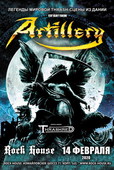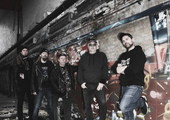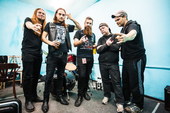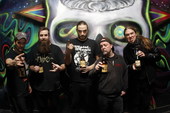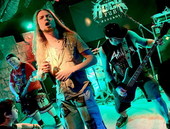Artillery
It’s Natural That Changes Happen Over 30 Years
10.02.2020
Архив интервью | Русская версияWe had quite a few solid reasons for putting together this interview. First, our previous conversation with guitarist Michael Stutzer of Danish thrash metallers Artillery took place as far back as 2011, and the band has released three interesting albums since. Second, Michael’s brother, Morten Stutzer, a founding member and a key songwriter of Artillery, has recently passed away, and obvious concerns about the band’s future needed to be addressed. Third, the Danes are about to embark on a Russian tour, which will take them to Moscow, St. Petersburg and Kazan in mid-February. And finally, this is just an overall fantastic band that yours truly has been admiring since 1992. Thus, a few days before boarding a plane Michael devoted some time to my questions…
Everybody knows now about the death of your brother Morten. Our condolences for your loss. My question is about the guy who is replacing him, Kraen Meier. Who is he? Is he a permanent band member?
He has been helping us on the live front because Morten hadn’t played live since 2017, so Kraen has helped us all that time. Now he’s a permanent member, and he’s been recording with us on the next album, and Morten really wished Kraen to continue for him in the band if something ever happened. He would always tell me, “Keep the band going,” and we are doing that. Kraen is also a very good friend of the band, we’ve known him for many years. I think he’s a good choice.
You and Morten were the main songwriters for Artillery all the time. Now will the rest of the guys contribute to music, or will you do all the songwriting, musically-wise, on your own?
I think I will still do most of the things, but I’m sure they will contribute something, because it’s not like I’m saying, “I have to do it all”. If anybody comes up with good ideas, we can always use them. And we are always in this companionate mode, we help each other. For example, I always go down for rehearsals with the drummer, Josua (Madsen), and we try things out. You could say it’s a cooperation. I still come with the main riff, of course, but still it is working like that, and it’s working good.
You will soon release a new single with several of your old singers – Flemming Ronsdorf will be there, and Soren Nico Adamsen as well. Is it going to be an original song, or a leftover from Morten?
We will do a totally new song the music for which I have already written. I will also put together some lyrics, and Michael Bastholm Dahl, Soren Nico Adamsen, and Flemming Ronsdorf will deliver some lyrics as well. It’s a song that we decided to do to honor Morten, to do the best for him, to give him the honor for the great work he did for Artillery. We call it a ballad song, because it’s about how he inspired the way. And there will also be an old song, on which Morten did a little bit of everything together with me in the old days, and we have to complete it now, I’ve never done it before. There will be these two songs on the EP that will be like a taster for the upcoming album, which we will do for Metal Blade later this year.
I remember from our previous conversation that you were not very much in contact with Flemming at that time. But later on he performed with Artillery at High Voltage Rock Awards 2017, and now he will be on your single…
Yeah, in the old days we were not the best friends, you could say it in that way, because I always wanted to tour a lot, and Flemming didn’t want to tour. That was always a problem inside the band. But I met Flemming some time ago, I think some four years ago, and we had a good talk. He told me he was having a great job now, he was doing everything that he as a singer wanted to do back in his Artillery days. He never does anything metal anymore, he hasn’t played metal since the “B.A.C.K.” album (2000), and he’s really not into that kind of style anymore. He lives by performing with his acoustic guitar that he would take around and play cover songs, doing this kind of small jobs, and he’s really fond of that. There’s no conflict between us anymore, and that’s good.
How did you get Michael Bastholm Dahl into the band? Why this particular guy? I guess there were quite a few people willing to sing with Artillery…
Yeah, but one thing that is really important for being in a band is that the people are good friends, that they can talk, be on tour together and have a great time. We played a show when Soren still was the singer, and we knew at that time he was gonna leave, because he wanted to do a lot of new projects. We played with a Mercyful Fate/King Diamond cover band, and Michael Bastholm Dahl was singing in it, and I was talking to him there. I knew that Soren couldn’t do two of the shows, so I asked Michael if he wanted to help us out on those two shows. He did that, and it went really good, and people were really fond of it. He’s a really great guy and also a very good friend, so it was very easy to get him into playing with us. He can sing very high and very low, he’s a very technical singer, and he can do really a lot of things. Of course, it’s more melodic than Soren’s or Flemming’s singing, but melodic thrash metal is the basis of Artillery. That’s the story.
After you played in Russia last time, in 2016, you were having a gig in Georgia, and you took onboard a Russian singer, Andrey Arkhont (Archontes) for it. How did it happen that you played in Georgia with a Russian singer?
What happened was really bad timing. Michael is a school teacher, and he had some exams coming in, or a session, that’s how it is called, and his job said they would fire him if he didn’t do that. It was really strange, because they had first said yes, he could leave, but on the day before they said, “You cannot do it”. We had to either cancel the show or find somebody else. Eugene (Silin, Russian promoter – ed.), who is a good friend of mine, told me that Andrey could do it, so I said, “OK, let’s try it. We can’t disappoint the people, I know that a lot of them have already bought tickets and want to see us play in Georgia”. So we did it that way, but we will never do it again, because it’s very tough. We didn’t rehearse together because we didn’t have time. Although Andrey did a very good job, so it’s not because of that, it’s just very stressful to do it like this. And we’ve never had that problem again.
You are embarking on a tour through Asia and Australia, and then you will come back to Russia after four years. What are your expectations from this tour?
Oh, they are very high. We’ve always got a lot of letters from Thailand, Singapore, the Philippines, Australia and New Zealand, and I’m really looking forward to do it, because we have never been there before. That’s a really big milestone for us to get down under and play there. And after this tour we will have the first Russian tour since 1989. Lately we have only played two shows in Moscow, but this time we’re also gonna play St. Petersburg and Kazan. That’s really cool, I think, because I want to see more of Russia than just Moscow. I haven’t had a chance to do it since 1989. That’s a long time ago! (laughs)
As you said, you first played Russia in 1989, and then you came back in 2014. In your opinion, what were the biggest changes in the country over that period? What did you notice first of all as an outsider?
I think there’s a lot of changes. I think the people were more open-minded, and they were taking care of things more. It was really cool. When we played the first time, the people were very crazy about music, and that was cool, but the Russian government, or rather the USSR government, was very strict and very tough against young people. Young headbangers were jumping onto the stage, moshing, stagediving and stuff like that, and they didn’t really like that. I don’t think that’s a problem today in Russia if people go crazy about music. As long as it’s not violent - very emotional, but not violent. The system in Russia is much better these days. I’ve got a lot of Russian friends, especially Eugene, and I think times have changed a lot. It’s natural that some changes happen over 30 years. But I think you as a Russian citizen know it even better than I do.
You did three fantastic albums in the 80s. but as far as I understand, the recognition that the band was getting back then was not as much as you are getting at the moment. Isn’t it strange for you that it took people such a long time to give Artillery what the band really deserves?
(laughs) I’ve been asked about that so many times, but I don’t want to think much about it. I really love to play, and I don’t think so much like, “Is the band getting big?” or “Are we earning this much dollars?” For me the most important thing is to have a great time, to get out and see countries, to have good friends and play for fans who have supported us. Of course, it would have been great if we had managed to become bigger at that time, because things would have been easier. But I still think the last three albums have got very good reviews, so a lot of people still remember the band, and even more are joining in, because the Internet and stuff have made it easier to learn about bands. And being a Danish band at that time also made things difficult, and if we had been a German band or a band from the U.S., it would have been a lot easier, I think, because Denmark is a small country, and many people don’t even know where it is. (everybody laughs) I also think that we had a chance after the “By Inheritance” album (1990), but we had too many disagreements in the band to go out touring. We should have toured a lot at that point, but some of the band members didn’t want to tour as much as I, for example, wanted to do. Also that was the time when grunge and death metal were the two styles that were going big, and we were losing a bit there, I think.
With so many albums to choose from, how do you put together the setlist? Are there any songs that you always have to play? And are there any songs that you would love to play, but have never had a chance to?
Heh, we are always trying to put one or two songs in the set that we haven’t played so much. But there are five songs that we have to play – “Terror Squad”, “Khomaniac”, “By Inheritance”, “Legions” and “The Face Of Fear”. People are saying every time, “Are you playing those songs?” But we love to play them, so there’s no problem, it’s not like we play a song and go like, “Ahh, not again!” We never think about it like that. But we have just taken “Beneath The Clay” up, we didn’t play it for a long time, we have taken “In The Trash” up to play, we have taken “Sworn Utopia” from the new album up, so we always try to put some new songs in. But it’s tough to do a totally different setlist, we have tried it a few times, and people say, “Why didn’t you play those five songs?” What we do is a compromise, I think. And at the end we have a very good set because people seem to enjoy it when we play.
You mentioned that the upcoming album will be on Metal Blade. But your most recent compilation “In The Trash” (2019) is not on Metal Blade, but on Mighty Music. How did it come together?
Yeah, it’s a Danish label. And the album “Deadly Relics” was first released, back in 1999, on that label. These two albums are old demo songs. I’m close friends with the guy behind the label, and he asked me maybe 10 or 20 times, “Can I put that out?” I talked to Metal Blade, and they said, “Yeah, do that! We don’t have a big interest in doing that”. So we did that, and I think it’s great, because now I have all demos in digital. (laughs) Not only on cassette tapes and stuff like that. I know there’s a lot of fans who collect old stuff. I think that’s cool.
Does it mean that your archive from the 80s is now empty? Or are there any other hidden treasures lying somewhere?
I think we still have some stuff, but we have to go through a lot of things. I know Morten had a lot of things in his hidings, I’m just on my way to check them out. I’m forgetting some of the old things, but Morten never forgot them. He would always hide them for himself, and would play them, like, “Listen to this, this is an old song”. I also think we will have some live things out at some point, but at the moment we are concentrating on the new album, I think.
You have a kind of tradition to re-record one or two old songs for every album. Usually they are demo songs which very few people have heard before. But why did you re-record “Doctor Evil” for the latest album? It’s a pretty recent song, isn’t it?
The story is that Metal Blade wanted two bonus tracks, and we had only rehearsed one at that point, because “The Face Of Fear” was finished very late compared to what we normally do. We didn’t have the time to do another song, but we had a version of “Doctor Evil” that was different from the one on the “Legions” album (2013). I talked to Metal Blade and said, “Is it OK if we use that as the second bonus track?” and they said OK. Officially I had to do another song, but in light of the time we had, we had to do it that way.
Why not re-record anything from your Missing Link days?
Maybe that will also happen, you never know. (laughs) At the moment both of the Missing Link album are getting re-released, too, by a Dutch company, and we have played one song live, the title track of “Lobotomized” (1997), two times. You never know.
On “The Face Of Fear” you wrote very dark lyrics for “Pain”, and it’s a rare case when you write lyrics yourself. What inspired you to do this?
Yeah, I’m not too much on the lyrics side, that’s mostly Michael Bastholm Dahl who is doing that. But “Pain” is written about an old friend I had. I hadn’t seen him for seven years, and suddenly one day I met him, and he was totally destroyed by drugs and everything like this. That inspired me - it was so sad to see him like this, and he died, I think, three weeks after that. That was really tough, so I had to let that out. Also on one album before (“Penalty By Perception”, 2016), I wrote the song “When The Magic Is Gone” – that was about the death of my mother and father back in 2000s. It fits totally to Morten now, so we played that in the church.
There were periods in the history of Artillery when the band didn’t exist. What were you doing at that time? Were you still playing music? And nowadays do you have any job outside Artillery?
I’m still working, at the moment I’m only working 25 hours (a week – ed.), because I earn the rest from playing, I’m playing all the time, making records, making radio shows and stuff like that. I’m really glad about that, because I can always come to work and say, “I can’t be here, because I’m going on tour”. That’s really cool. In the old days, when Artillery stopped, in 1991-1992, I started the Missing Link project, and Morten got onboard later on, and we were together in that until 1998 or something like that. Then we tried to reunite Artillery, but it was more like a project, because Flemming always said at that time that he didn’t want so much to play live. Thus, we never really got to doing it. Then we had a break again, from 2001 to 2007, and at that time Morten and I still played music together. We wrote a lot of songs, and many of them we had never used. Those are songs that are totally different from what we normally do – we did them just to see how it would sound. In 2007 when we decided to reform, we had to do it with another singer, and it was really good that we did that, because now we can play about 80-100 shows each year. And that’s very important for a band – if you do a new album, and you don’t tour, people will forget you.
I agree that it’s great that you reformed. I first heard the band in 1992, and for many years I never even dreamed to see you live, because the band didn’t exist…
Myself too, I never thought that I was gonna play Australia, for example, or South America – but these things are happening! That’s one of the great things that come with playing music – you can come and see those countries, play there, and meet metal fans. Metal fans are everywhere, and they are really the same, even if you play in Bolivia, Turkey, Russia, Japan, you name it. They have one thing in common – they just love metal.
You mentioned that it was tough to be a Danish band in the 80s. And what about now? Are you comfortable living in Denmark?
Yeah, I love to live in Denmark, it’s a really good country. I’m sure my friend Eugene can tell you about that, because he’s been here a lot of times. We have a very good social system that really cares about the weak and the poor, our hospitals are free, which is cool. Also we have very good ways for you to go to school, be educated, and be really good at that. I think Denmark is a good land. Sometimes it’s maybe too small, because there’s not many people here, but I still love to be here.
Are there any young Danish metal bands you would recommend to check out?
We have the band Impalers, which has now changed to Arch Angel – that’s a very good band. There’s a lot of bands in Denmark at the moment who have Danish names that are really weird, but as to some of the older ones, check out Impalers, their albums are really cool. It’s more like the old German way to play thrash metal.
Actually I’m running out of questions for now. Before we wrap this up, can you say a few final words to your Russian fans?
Hey, this is Michael Stutzer from Artillery, we’re really looking forward to return to Russia again! Hope you will be there, so we can see you through the Face Of Fear! Take care and stay metal!
Artillery on the Internet: http://www.artillery.dk/
Special thanks to Eugene Silin (Alive Concerts) for arranging this interview
Roman Patrashov
January 23, 2020
© HeadBanger.ru
